Commuting and First-Year Students During the Pandemic
By Aaron Jaramillo and Katelyn Espinoza, undergraduate students at St. Mary's University
Life for students, both old and new, has changed drastically for students at St. Mary's University--a Catholic, Marianist university in San Antonio, Texas. The pandemic has forced students to come up with new ways of navigating college life while pushing the virus to the back of their minds. Classes have partially or completely been moved online. Social distancing protocols surround campus, and even professors' usual one-on-one in-person office hours have adapted to an online setting as the fear of contracting COVID runs rampant. It's a unique situation that the average person would not have predicted, and students, whether commuters or first year students, have all had challenges to overcome.
Commuting Students
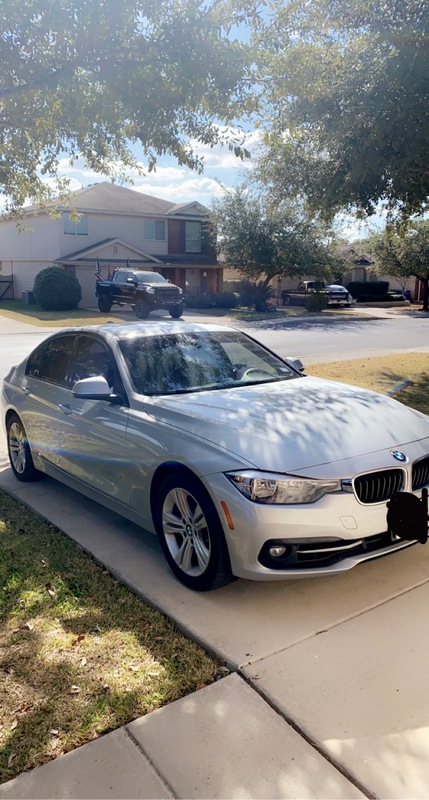
The Use Of A Commuting Students Vehicle
Former commuting students have little use for their vehicles after the pandemic forces classes to be online.

A Students New Desk During Covid-19
A student's new desk is just one example of how virtual students attend class now because of the pandemic.
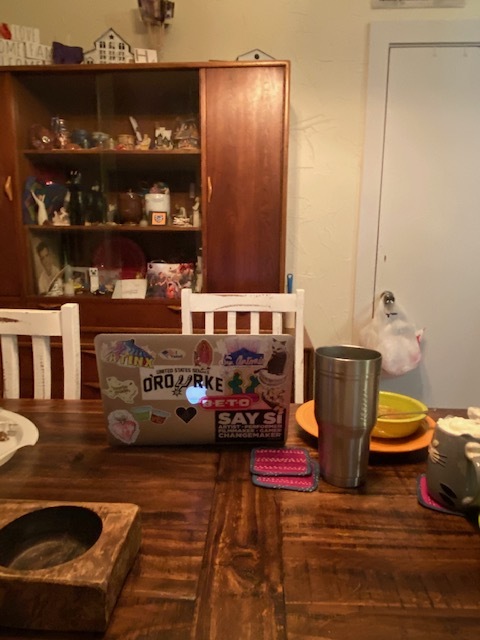
How am I Supposed to be a Student When the World is Burning Down Around Me? A Student’s Personal Experience
This student showcases the challenges students face in an unfamiliar semester, and how virtual classes have affected students' experiences.
Commuting students had a real change this semester with COVID-19 compared to a normal semester. Before, students had a specific process they had to go through before coming to school. A student would make sure they had the textbooks they needed for that day of class, factor in the commute time to get to class on time, and select an outfit for the day. However during the pandemic, a student does not need to do these tasks anymore since their bedroom, office, living room, etc. are now their classroom. Taking all this into account, many students now stay home to attend class. We can no longer refer to these students as "commuter students" but as virtual students.
Staying Connected
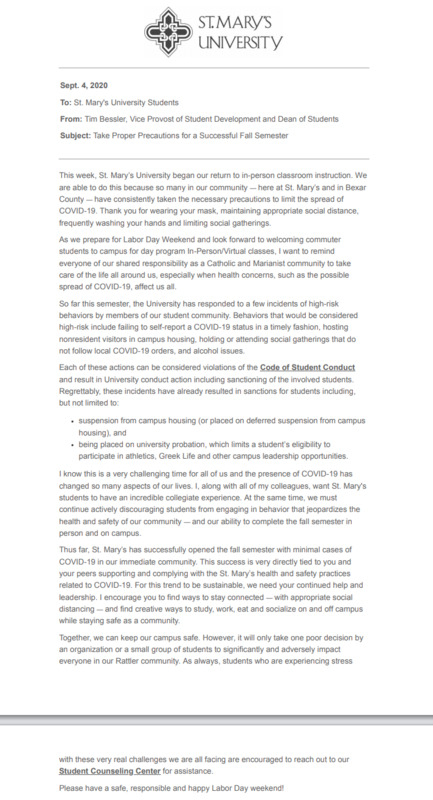
Precautions and Code of Student Conduct at St. Mary's University during COVID- 19 Pandemic
This email discusses the precautions students and faculty should take to ensure safety; it also mentions consequences for those who do not follow these rules.

Staying Connected As A Commuting Student
This email sent to students provides suggestions on how they can still be engaged with the community while being safe.
St. Mary's is still trying to keep students engaged in the school community by holding events on campus while promoting social distancing and precautions needed to stay safe. Staying connected and student engagement is a big focus here at St. Mary's and they figured out how we as students can do this. As students, we can stay connected on our phones through group chats, holding commute-only specific events, or school-wide events to engage with the ministries on campus.
The New First-Year Experience
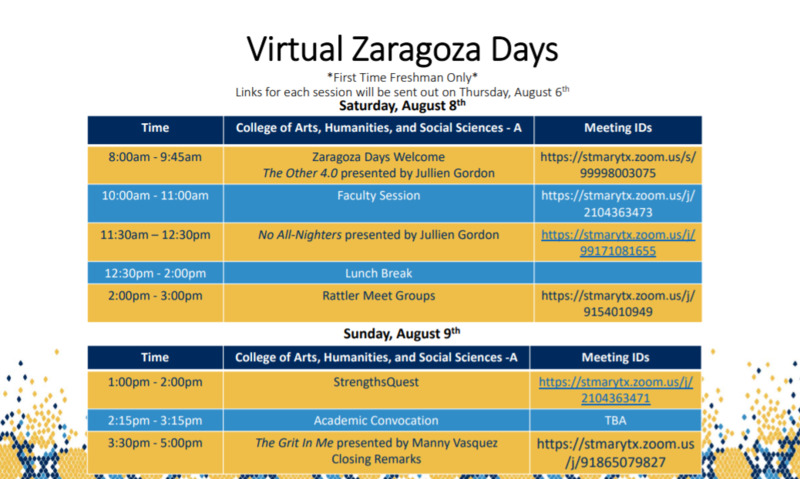
The Virtual Zaragoza Experience
The Annual St. Mary's Zaragoza took on a virtual setting during the pandemic.
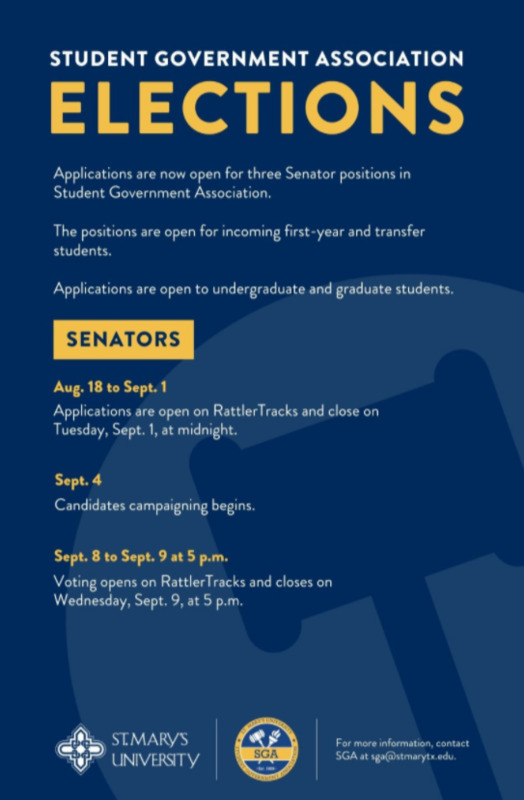
How St. Mary's University Clubs are recruiting first time freshmen
Upperclassmen now have to rely on emails to recruit freshmen since the new online St. Mary's experience and social distancing protocols make it difficult to recruit them in person.

Dorm list upgrade: Masks are the new essential item to bring to college
Masks became the new essential dorm list item after the pandemic completely shifted freshmen's dorm shopping priorities.

Anonymous Oral History, 2020/11/21
A St. Mary's Freshman discusses how COVID has impacted her freshman college experience.
The traditional "freshmen" experience has become a false reality to a lot of first-years. With the pandemic taking control of how professors should teach, how schools should run, and how students should live their college lives, it is not surprising that this experience is completely different from the freshmen of 2019. Whether it be a new virtual Zaragoza (an orientation event held on campus for St. Mary's freshmen), the difficulty of joining campus clubs, or investing in anti-pandemic essentials like masks, first-years have had to overcome it all in order to successfully adapt to their unique college freshmen lives.
First-Year Pandemic Study Habits
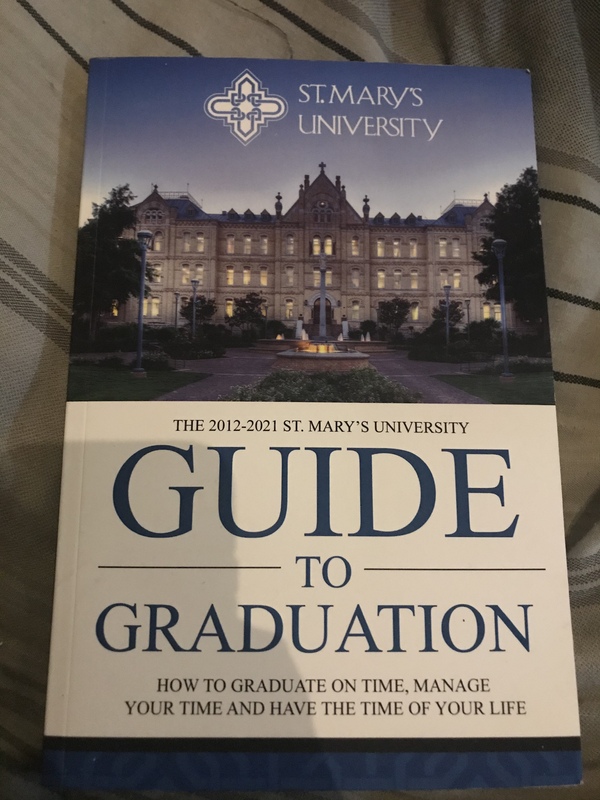
St. Mary’s Graduation Planner
St. Mary's provides freshmen with graduation planners in order to guide them through their classes while navigating online schooling and a pandemic.
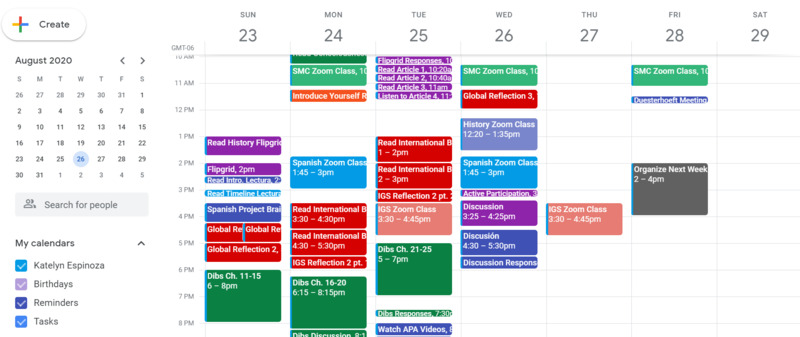
Freshmen Study Lifesaver
A Google Calendar became a study necessity for a St. Mary's freshman while navigating online school.

Monserrat Garcia Oral History, 2020/11/21
A St. Mary's student provides her experience of coping with college and the pandemic, and what study habits she has relied on.
Normally, a first-year wouldn't have as much as a struggle because they would have access to many of St. Mary's resources in person. However, for many reasons, these are no longer accessible or more difficult to access. Overall, there is a new added stress onto first-years to attempt to figure things out on their own. Some may have to rely on their own discoveries like a student relying on google calendar; some may rely on planners provided by the school. Other students may have also figured out completely new methods no one has thought of. The point of it all is that the pandemic has been real hard on first-years who have to struggle with their first time in college and a worldwide pandemic, but these adaptations have made them stronger and put a whole new meaning behind the "freshmen experience."
Unfortunately, this year college looks very different from a year ago. Our classrooms became our bedrooms. Our Zaragoza became mere presentations on our laptops. Our 2020 college experience is completely molded by our COVID-19 experience. Yet despite all these sudden changes and challenges, commuters and first-years put in their efforts to persevere and navigate the plague year as best as they could.
